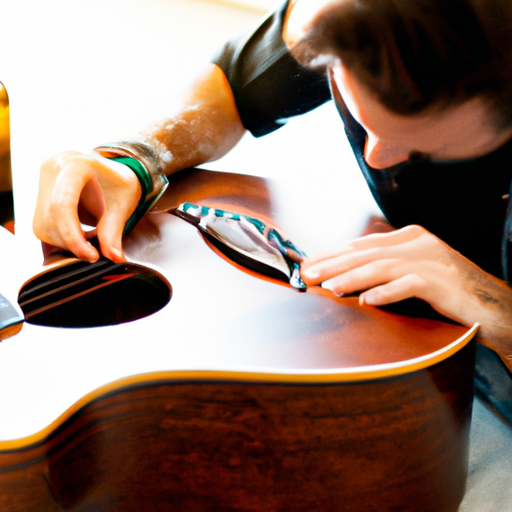
As a guitar player, you know that your instrument is more than just a tool for making music. It's a work of art that requires regular care and maintenance to keep it playing and sounding its best. In this article, we'll explore the importance of guitar maintenance and offer tips and advice for keeping your guitar in top condition for years to come.

Guitar maintenance is an essential part of being a responsible guitar owner. Regular care not only keeps your guitar looking and sounding great, but it also extends its lifespan and protects your investment. Whether you're a seasoned pro or a beginner, taking care of your guitar is a must.

One of the most crucial aspects of guitar maintenance is regular care. This means cleaning your guitar, changing strings, adjusting the action, tuning, controlling humidity, and protecting your guitar from damage.
Cleaning your guitar is an important part of regular maintenance. Dirt, sweat, and other debris can accumulate on your guitar and affect its sound quality. There are a variety of cleaning solutions available, including specialized guitar cleaning products and household cleaners. However, it's important to use the right type of cleaner for your guitar's finish to avoid damaging the wood or finish.
To clean your guitar properly, use a soft cloth or microfiber towel to wipe down the body, neck, and strings. Be sure to avoid getting any cleaner on the hardware or electronics.
Changing your guitar strings regularly is essential for maintaining good tone and playability. Over time, strings can become dirty, worn, and lose their brightness. There are a variety of string types available, including nylon, steel, and coated strings.
To change your strings, first remove the old strings by unwinding them from the tuning pegs and removing them from the bridge. Then, replace them with new strings and tune your guitar to pitch.
Proper action is crucial for good playability and tone. Action refers to the distance between the strings and the fretboard. There are several types of action adjustments, including truss rod adjustments, bridge adjustments, and nut adjustments.
To adjust your guitar's action, consult your guitar's manual or take it to a professional guitar technician for help.
Tuning your guitar is essential for good sound quality. There are a variety of tuners available, including clip-on, pedal, and smartphone apps.
To tune your guitar, first, determine which tuning you want to use. Then, use your tuner to adjust the pitch of each string until it's in tune with the correct note.
Humidity control is crucial for protecting your guitar from damage. Extreme temperature and humidity changes can cause the wood to warp, crack, or even split. There are several types of humidifiers available, including room humidifiers, guitar-specific humidifiers, and case humidifiers.
To maintain proper humidity levels for your guitar, use a hygrometer to measure the humidity in your guitar's environment and adjust accordingly.
Protecting your guitar from damage is crucial for maintaining its value and playability. There are several types of cases and bags available, including hard-shell cases, soft-shell cases, and gig bags.
To properly store your guitar, keep it in a climate-controlled room and avoid exposing it to extreme temperatures or humidity changes.
Maintaining an electric guitar is slightly different from maintaining an acoustic guitar. In addition to regular cleaning and string changes, you'll also need to maintain the electronics and hardware. This includes checking the pickups, pots, switches, and jack for any damage or wear.
To maintain your electric guitar, consult your guitar's manual or take it to a professional guitar technician for help.
Acoustic guitars require similar maintenance to electric guitars, but with a few key differences. In addition to regular cleaning and string changes, you'll also need to maintain the bridge, saddle, and nut. This includes checking for any damage or wear and making adjustments as needed.
To maintain your acoustic guitar, consult your guitar's manual or take it to a professional guitar technician for help.
Guitar maintenance is essential for keeping your instrument in top condition for years to come. By following these tips and advice, you can ensure that your guitar stays looking and sounding great, and that it continues to bring joy and inspiration to your playing.
Remember to clean your guitar regularly, change strings, adjust the action, tune your guitar, control humidity, and protect your guitar from damage. With a little bit of care and attention, your guitar will continue to be a faithful companion for many years to come.
Read more about guitar maintenance and care tips here.